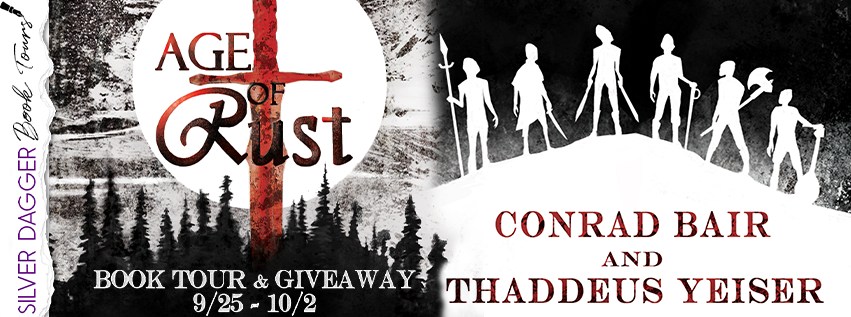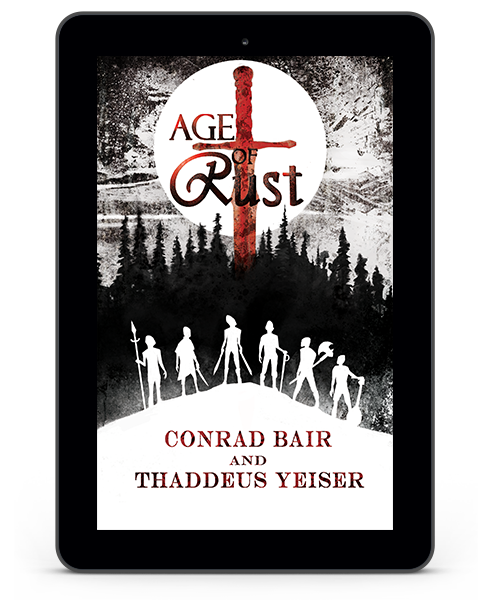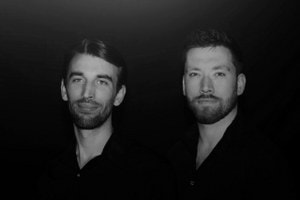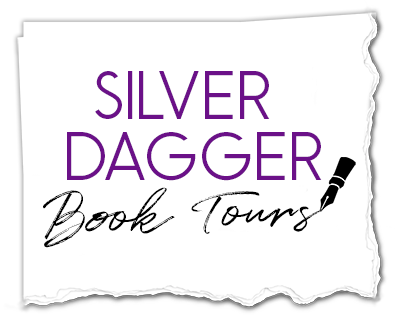Age of Rust is a tale of displaced youth, the struggle for life, and the peril of love in war-time.
Age of Rust
by Thaddeus Yeiser & Conrad Bair
Genre: Dystopian War Fiction
No records show how it happened, though everyone has their beliefs as to why the golden age of man fell seven hundred years ago. Since, humanity has managed to rebuild a modest civilization from the ruins. Now a medieval war begins to ravage the land once known as America. The lives of six young men become ensnared in the violence as they serve the Eastern army. Chief among them are Tavin, the son of a respected general and Seneca, a physician drafted away from his studies.
But the six heroes notice that something has changed inside themselves. Their minds are subtly connected in a way that cannot be explained but lends them increased prowess on the battlefield. Inevitably, their skills place them on a collision course with Kayzitt that will shape the future of the nation.
Amazon * Inksmith Publishing * Bookbub * Goodreads
Age of Rust - Excerpt 1:
We say that we would do anything for each other, but in the worst times will they listen to me? Will they be able to comprehend what is at stake? Will they rise above themselves and meet the challenge? Can they possibly understand how wrong this can all go? We call ourselves warriors, but I question if they know what that title entails.
The howl of a lone wolf found Tavin’s ears, making them hum with the steady tone despite the miles between. As if to listen closer, Tavin pulled away from the girl, peeling his lips off hers and craning his neck to look out the chapel window. Hauntingly, the howling stopped, slipping off at the end of its note, but Tavin kept his gaze beyond the stone walls. Something about the timbre had snapped him to attention. Outside the night was cool and still, the moon and its light had disappeared behind the mountains around the town and on the horizon was the hint of sunrise.
“Do you not like wolves?” asked the girl. “Do they scare you? I think they are beautiful creatures. Lovely, when you get past the teeth.”
Tavin turned to her again. She was soft in the gentle light of night, a thin thing who was admirably young and energetic.
“No, I’m not afraid of wolves.”
He flashed her a reassuring smile. It was his smile that people were always drawn to. They could not help but smile back. He touched the woman on the jaw and rubbed the same place she had been rubbing his beard moments earlier. Their eyes locked for a lingering, peaceful moment.
Feeling the hardness of the ground against his knees, Tavin stood to relieve it. He covered her kindly with the blanket they had borrowed from the chapel offices, and then walked to the window of their steeple hideaway. Tavin had looked forward to sneaking up here with a woman for the past week, but now something chewed at his stomach.
“Do you even remember my name?” she asked with charming accusation.
Tavin could feel the arrogance in his automatic grin.
“Of course, Marlies. Marlies, Marlies, Marlies,” he echoed.
“I’m impressed, all you soldiers tend not to care about the details.”
“Well I’m not most soldiers,”
Tavin said, his eyes, now adjusted to the moonlight, on the
flickering lights in the distance. He propped his elbows on the cold
hard surface and tried to look closer. Campfires, he assumed, but
they looked different. The drift of chilled air through the window
had an anxious scent.
“I thought as much when I first saw
you in the tavern. You have such serious eyes for how you danced
around.” She made more room beneath the blanket again and adjusted
herself. “Here, I’m cold, get under the blanket. What interests
you so much about the window anyway? Are you trying to see the
Western camps?”
Tavin paused, then turned and rejoined her as she requested. It was much warmer beneath the blanket and she was much softer than the stone walls.
“Perhaps I was,” he said, “there are three thousand of them out there in the fields. We should be able to see them from up here. But it’s still too dark.”
“Three thousand? Really?” she asked with a tone of false surprise. “My father was saying that there are only four hundred of you here to guard the town. Is that true?”
“Yes, it's true,” Tavin sighed. “I did not think it a point of discussion.”
“Don’t be naïve.” She hit his shoulder. “It is the only point of discussion these days. Why do you think they haven’t attacked yet? It makes me so nervous, the way they sit out there and burn their fires and ride their horses close to the walls and shoot arrows at the blockhouses.”
Tavin sighed again. The horizon was a bright purple now but there would be another hour or two until the sun rose.
“Well, they don't exactly know how many of us there are, so… we'll let them take their time. At least until reinforcements can get here. As soon as that happens my friends and I can finally rotate to the fortress.”
“It figures. I didn’t think this was going to last long,” she replied. “You and I, I mean; though the war as well. I suppose I never thought either would drag on like it has.”
“Drag?”
“No offense, the war drags, whereas you have been a welcome surprise.”
“Well the reinforcements still haven’t come. And there’s been no word to suggest they are coming soon. You might have to put up with me a little longer yet.”
But there was a chewing at his stomach that made Tavin feel the beginnings of terror. The way his words reverberated off the stone walls of the chapel pinnacle, cold and hollow, he could feel that they were wrong. He stirred beneath the blanket again, agitated.
“What would happen if the West takes the town? What would happen to us? Am I just another notch on your scabbard? I think that we could still be happy no matter who is in charge.”
Tavin glanced to where his swords lay propped against the wall. For a second, he regretted having ever removed them. They were a defensive comfort in times where comforts were few.
THAD’S ANSWERS
Where did you come up with the names in the story?
-This world is supposed to feel like a place out of time, so I took a bunch of different world cultures and threw all the names in together. You’ll see names ranging from Greek to African to modern American.
What makes a good story?
-It’s a bit of a cliche, but a good story should create an emotional response. More specifically I think there’s a bit of a contract between a writer and their audience. The audience agrees to follow the writer on their journey. They invest themselves into the storyline and the characters, and they begin to form expectations. In exchange the writer should “pay off” those expectations to at least some degree. Subversion can also be a great tool in modern stories, but there always needs to be some reward for the audience’s time and attention.
Do you try more to be original or to deliver to readers what they want?
-This ties in well with my previous answer. There has to be a balance between delivering original ideas (which often means subverting audience expectations) and giving readers what they crave. Readers don’t want to be able to predict everything that will happen in a story, but they also don’t want their time wasted. I struggle with threading this needle at times, but here’s an extremely simple example. Let’s say that a story has a mailman for a main character. One of his struggles is that every day he is worried about being attacked by a dog. If you don’t eventually pay off that plot thread, by having him confront a dog, your readers will be disappointed, but at the same time you can be original about it by having the interaction with the dog go completely against what the audience is anticipating.
What is your writing process? For instance, do you do an outline first? Do you do the chapters first? What are common traps for aspiring writers?
-A consistent writing process is absolutely critical when working with a partner. We have always tried to get a 30,000 foot view of a story first. Where do the characters begin and most importantly where do they end up? Then we like to zoom in a bit and go through the events chapter by chapter and figure out what the main story beats will look like. Finally, after we agree on how everything will play out, we can start working through the actual writing. We like to focus on the main action and the dialogue first, and then work on prose second. The first draft will resemble a fleshed out screenplay and the second draft will finally take the shape of a novel, and then from there comes the back and forth of editing.
A common trap would probably be the resistance to plan out their stories. It can seem tedious and it's so tempting to just get right into the story, but often writers will write themselves into a corner, and end up creating more work for themselves.
Do the characters all come to you at the same time or do some of them come to you as you write?
-I find that most of the characters will reveal themselves during the initial storyboarding. A few more will come along later, but it's rare that I am writing the meat of the story and discover a new character that should inhabit a scene. That could be a flaw in my writing where I might have tunnel vision and not want to stray from my initial plan, but other than a few minor inclusions it hasn’t really occurred to me that I was missing a key character.
More often than not I have included too many characters. As a matter of fact, while writing the first book, we deleted an entire villain from the first half of the book because the character was a redundancy.
What kind of research do you do before you begin writing a book?
-For Age of Rust I had to do a considerable amount of research on the American landscape, and geography. The story’s technology is horse and buggy and the characters move around a lot so understanding distance is critical. I want to make sure that the time it takes for characters to traverse from point A to point B is at least plausible. I would also have to take into account terrain, obstacles, and the time of year. Would there be snow on the ground in this part of the country? What time is sundown in March? These elements could be tedious to collect but it’s amazing what little details will pull a reader out of a story.
What is your favorite part of this book and why?
-I don’t want to spoil anything so I will just say that my favorite part of the second book is that we didn’t end the saga after two books. We originally wrote a complete end to the series after this latest book, and felt like we’d run out of ideas. I had always envisioned at least a trilogy so I was fairly disappointed, but thought it was a solid ending. Eventually inspiration struck and we formed a third story that both expanded on the first two books and brought the story to a much stronger and more satisfying conclusion.
We ended up rewriting the last quarter of book two into the story we have today and we couldn’t be more proud.
Tell us about your main characters- what makes them tick?
-The one consistent element with our main characters is that they’re young people who are completely over their heads. They’re all part of this generation that had its life upended by war. No matter who they are, danger is lurking somewhere. Sometimes the danger is frantic and right in front of them. Sometimes danger is something they’re heading towards, or running away from. Sometimes the danger is far away on the horizon but they know it’s only a matter of time. I enjoy exploring how different people react to these pressures. Some people collapse, some people rise to the occasion. This is a collection of characters who feel the wolf at the door almost every moment of their life and it makes for a harrowing existence.
The fun thing about these characters is that the quiet moments, those rare times that the wolf is nowhere to be seen, are beautiful scenes to write.
What book do you think everyone should read?
-And Then There Were None by Agatha Christie. It is the perfect mystery novel from the perfect mystery writer. Forgive me if I spoil anything (though it was published in 1939 so I think the statute of limitations is up). The way she structured the events made it virtually impossible to solve the crimes, and at the end of the book you are left guessing who could have been the murderer. She actually had to add an epilogue from the perspective of the killer, confessing their crimes, for the audience to have any clue what really happened. I think a huge struggle when constructing a mystery is telegraphing your moves to the audience, and she never made that mistake. Riveting novel.
Do you have a favorite movie?
--Yes, Blade Runner. I first watched it in High School and my love for the film has only deepened with time. Blade Runner is a full sensory experience. The visual elements are astounding and the sound track basically invented a genre, but the ideas it presents are simply profound. The idea that an android, designed to kill and given no emotions, could discover its own humanity in the face of annihilation is staggering. The movie blurs the lines between hero and villain better than any other story I’ve ever watched/read. I cannot recommend the movie enough.
If you could tell your younger writing self anything, what would it be?
-I would tell my younger self that comparison is the enemy of joy. Obviously many things that I’ve written have not worked as a story, or they were missing critical elements. They could never measure up to better works but they still had value. I practiced, I made mistakes, and I got a tiny bit better as a storyteller. No writer should ever feel ashamed of their work.
How long on average does it take you to write a book?
-We’re currently at about 9 months or so to go from the storyboard to completed work. I don’t know whether we should speed that up or draw it out, but the timeline seems to be fairly consistent.
How long have you been writing?
-I’ve been writing since I was 11. I started out writing Star Wars fan fiction. Yes, you read that correctly.
Do you prefer to write in silence or with noise? Why?
-I am easily distracted, so silence is a must, but I also enjoy sounding my dialogue out at times, and music or TV can interfere. That said, some nature sounds in the background can be a plus.
What did you enjoy most about writing this book?
-This series has given me an opportunity that not all writers get. It’s been a chance to craft a book series with my best friend. Every idea, story beat, character, has to be agreed upon, and has made us better writers than we would have been on our own. There were many three or four hour phone calls spent discussing chapters, or trying to figure out how to make certain plot points work. The feeling of finally getting past a hurdle never gets old. Those conversations are some of my favorite memories, and I will cherish them the rest of my life. I don’t necessarily think it would work for everyone, but I’m glad we’ve had this opportunity.
If you knew you'd die tomorrow, how would you spend your last day?
-Just one day? Well, traveling the world is out so I would try and talk to as many family and friends as I possibly could. I would apologize that I didn’t spend more time with them, tell them my favorite thing about them, and tell them I love them. Then I’d spend the last part of the day with the love of my life and make sure she knew how much she made my life better.
What kind of world ruler would you be?
-I would try to be the kind of ruler that can admit what I don’t know (There is quite a lot). I would try to bring experts together and listen to people. In the words of Nelson Mandela, leaders talk last.
Where were you born/grew up at?
-I was born in Butler Pa and lived in a little town called Saxonburg. My father was a Lutheran minister and my mother raised children and eventually became a social worker. Butler was a tiny farm community 30 miles north of Pittsburgh. I lived there until I was 8 and then we moved to Erie Pa by the Great Lakes. I lived there until I was 14 and then we moved to central PA in a town called York. All in all I’ve lived in 7 places around Pennsylvania and Delaware. Pennsylvania is, oddly, one of the most unique states in the country. Not because of the way that it looks but just that it doesn’t fit into any one specific region. It’s not in New England, it’s not on the coast, it’s not in the Midwest, it’s not in the south. It’s entirely its own thing.
Facebook * Twitter * Twitter * Twitter * Instagram Instagram * Instagram * Bookbub * Bookbub








This story sounds really good. I like the cover.
ReplyDelete